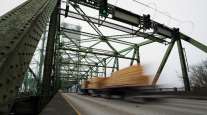Trucking Industry Figures Speak Favorably of an Increase in the Federal Fuel Tax

It isn’t often that industry supports raising taxes. That seems to be the case with American roads and bridges, however, with both industry officials and the Trump administration signaling that they might be amenable to raising the federal fuel tax to pay for road improvements.
During a committee hearing May 17, Transportation Secretary Elaine Chao said that the administration’s infrastructure plans would rely primarily on private funding, but said that a fuel tax was not off of the table as a funding source. Representatives of the railroad and trucking industries appear to support the suggestion, seeing it as a user-based funding source.
RELATED: White House not ruling out fuel-tax increase for infrastructure, secretary of transportation says
America’s roads need work, particularly as the country and our economy continue to grow.
“Roads are the country’s circulatory system. If this were our body’s circulatory system, I think we would all be looking to get some stents or surgery,” said David Manning, vice-chairman of American Trucking Associations, showing a map of projected freight traffic growth which predicted congestion along major freight corridors.
Currently, the federal fuel tax rate is 18.4 cents per gallon for gasoline and 24.4 cents per gallon for diesel fuel. The tax is not indexed for inflation and has not been raised since 1993.
Despite the millions of tons of goods moved on America’s roads, freight transportation did not have its own budget line prior to the 2015 FAST Act, which provided dedicated funding for bridges and refocused existing funding for a national freight highway system.
RELATED: Infrastructure stakeholders press congress, administration for funding boost
Although the FAST Act provided some funding for freight, industry leaders admit that it is not enough to work through the backlog of projects that already exist, nor to pay for future expansions.
“A fuel tax is the preferred funding mechanism because it is user based and has a very low administrative cost,” said Manning, who recommended that the fuel tax be indexed for inflation and in order to help promote fuel efficiency.
An adjustment to somehow tie the fuel tax to rising efficiency standards could mitigate another problem with the tax as a funding source — namely that as the industry becomes more efficient, the money raised could plateau even as miles driven increases.
While the trucking industry was encouraged by the inclusion of freight transportation funding in the 2015 FAST Act, the railroad industry was less pleased. Unlike trucks, trains run on rail networks that are privately owned, maintained, and constructed.
Fuel taxes also have the advantage of serving as a de facto “user fee” for roads and highways. This element is appreciated by the railroad industry, which has been hesitant to support federal infrastructure projects that essentially subsidize their overland freight competition.
“On the one hand we look at trucks and ports as our partners and a major part of the supply chain,” said Roger Nober, Chief Legal Officer of BNSF Railway, “but on the other hand, as we look at FAST Act, we have to keep in mind that we are privately funded. The other modes, if they are funded by a user pay system, then we think that is the right policy approach.”
For railroads to build and maintain their own tracks while competing with trucks that run on federally financed roads and bridges creates a competitive imbalance said Nobler. “We cannot move away from a user pay system and in recent years we have gotten away from that.”
The tax would also have the benefit of being a dedicated funding source, which would not require annual Congressional renewal. On a local level, this makes future infrastructure expansion more certain because it allows for longer-term planning. A dedicating funding source would also help get money to projects more quickly, meaning less time will be spent talking about infrastructure and more would be spent building.
“Freight needs to step up and demand its own sustainable funding stream not connected to federal highway funding,” said Rep. Alan Lowenthal, (D-Calif.), who also spoke about the need to move towards a user fee that would help to incentivize communities to work together.
Industry support will no doubt be helpful as the administration fills in details of its proposed infrastructure investment plan. In the meantime, leaders in Congress and in the industry are working to garner support for the tax increase.
Distributed by Tribune Content Agency, LLC




